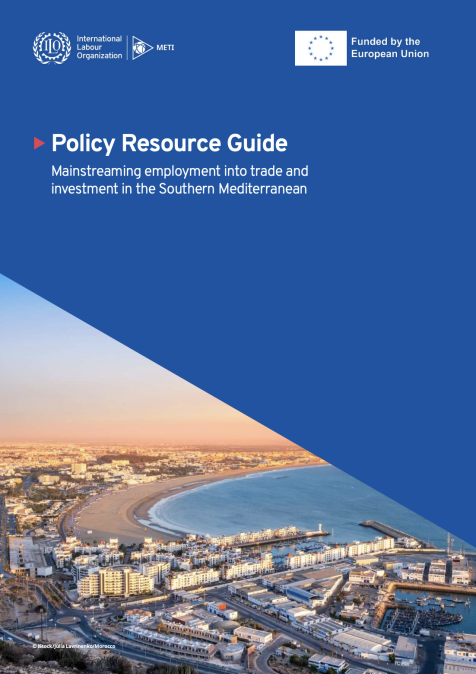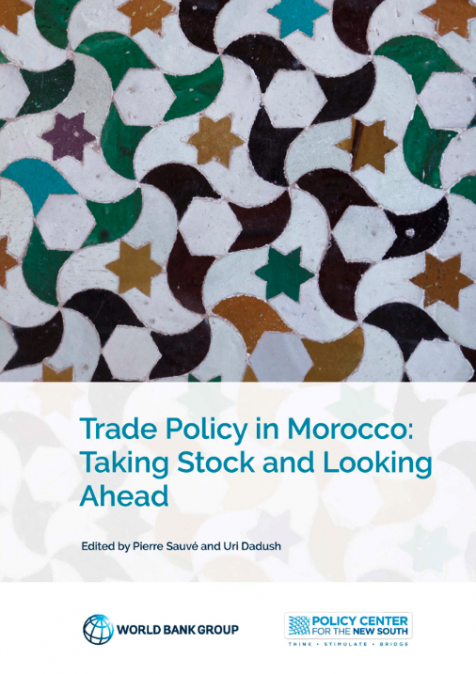Publications /
Opinion
Morocco has made important strides in reducing poverty in the last three decades, thanks in large part to trade and industrial policies aimed at durably inserting the country into world flows of goods, services, and cross-border investment. Since 1992, per capita incomes have tripled (in current US$), contributing to a threefold drop in the Kingdom’s poverty headcount. The country of 37 million features consistently as one of the better-performing and more stable economies in the North Africa and Middle East region.
Despite the challenges posed by the COVID-19 pandemic, rising international prices, and geopolitical tensions, Moroccans continue to reap the benefits of their economy’s openness. These include widened consumer choice and improved welfare, the growing involvement of Moroccan firms in technology-intensive global value chains, and robust growth in exports and foreign direct investment -- all powered by modern port infrastructure and logistics platforms.
Still, as underlined in a recent Royal Commission report on the Kingdom’s New Development Model, Morocco can and must do better. Moroccans are keen to see their living standards, which stood at one tenth of the EU average in 2021, converge faster with those of their neighbors to the north. After the 2008-09 Global Financial Crisis, Morocco’s economy slowed sharply, and its fiscal and current account balances have become more precarious. Responding to a request by the Ministry of Industry and Trade, analysts at the Policy Center for the New South, Morocco’s leading think tank, and the World Bank identified a range of steps that the Kingdom can take to fully realize its trade potential. These are summarized in a joint report, Trade Policy in Morocco: Taking Stock and Looking Ahead.
Strengthening the competitiveness of Morocco’s exporting and import-competing firms lies at the core of the efforts needed, requiring reforms and investments that go beyond the narrow realm of industrial and trade policies. Some of these reforms, such as improving the skills base of the labor force, may take longer to materialize. Others can be implemented faster. These include improving the investment climate, easing pressures on the public purse by boosting private investment, and ensuring that the exchange rate remains competitive and adjusts more flexibly to domestic and external shocks.
The publication emphasizes the importance of paying greater attention to the export potential of Morocco’s vibrant service sector, the Kingdom’s top foreign exchange earner and leading source of employment, particularly for female and younger workers. Services account for 47 percent of formal sector jobs and have supplied close to nine in 10 new jobs in recent years. Services growth is crucial to addressing unemployment and absorbing workers who are moving out of agriculture.
Morocco’s services ecosystem ranges from traditional sectors, such as transportation and tourism, to high-value exports in financial, telecommunications, and professional services. The country is well placed to leverage its sophisticated regulatory environment to lead continent-wide efforts at boosting digital trade. This would benefit its export-oriented digital services sector, which has made significant inroads in business and IT outsourcing, particularly in African markets.
Morocco also performs strongly in agricultural trade even as the country remains a net food importer. It ranks among the world’s top exporters of tomatoes and green beans and is a significant exporter of other vegetables, citrus fruits, and berries. Considerable scope exists to diversify and add value to Morocco’s agri-food export basket to new destinations, while adopting greener energy sources and smart, water-saving production methods. Over four-fifths of Morocco’s agricultural exports go to trading partners with which it has negotiated preferential terms of access, underscoring the importance of trade policy to the sector’s continued growth.
To harness trade’s growth and job-creating potential, deeper trade agreements extending beyond merchandise are needed, starting with efforts to broaden two-way ties with the European Union, Morocco’s leading trade and investment partner. Large parts of the EU market, beyond France and Spain, remain largely untapped. Despite recent progress, particularly in services, Morocco’s penetration of African markets, which stand to be boosted by the African Continental Free Trade Agreement (AfCFTA), remains below potential. Meanwhile, Morocco’s exports to Asia—the world’s largest and fastest-growing trading region—are dwarfed by its imports. Greater export-promotion efforts by Moroccan agencies and the largest private firms can go a long way toward deepening ties with such promising markets. Morocco also must strengthen the capacity and voice of its trade diplomacy, which has suffered from undue institutional change in recent years.
Morocco has built a strong foundation for further trade success. Its advantages include access to both the Mediterranean and Atlantic oceans, proximity to Europe, a diversified export basket, and high-quality trade infrastructure. The Kingdom can draw on an extensive network of preferential trade agreements—it is one of a handful of nations with free trade ties with both the European Union and the United States—and has joined high value-added regional and global value chains, for instance in automobiles and aircraft parts. Morocco’s future growth trajectory, and its ability to shield itself—and benefit from—fragmenting world economic forces, stand to be well served by a continued pursuit of open trade and investment policies and by sustained efforts at building a more competitive, inclusive, and resilient economy.









